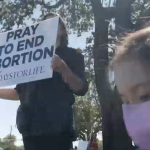Spanish ministers have passed a draft bill on LGBTQ+ rights to allow people over 16 to change their gender and name without doctors or witnesses.
The proposal, described as “a giant’s step”, could still change as its legal draft must undergo a lengthy parliamentary debate.
However, if approved, the legislation could put Spain among a handful of countries to allow gender self-determination.
This means a person can change their gender and name without a diagnosis of gender dysphoria or requiring their physical appearance to conform with traditional male or female expressions.
Under the proposals, the changes in the official registry would take up to four months from the first application – which is faster than most other countries.
The process would be easily reversible for half a year, but would require going to court after that.
In England, a person wishing to change gender must complete a two-year waiting period, a review by a specialist panel and a £5 fee.
The Spanish proposals have been controversial from the start, with some feminists arguing the law blurs the concept of biological sex.
It also sparked an internal battle within the left-wing ruling coalition, with the leading Socialists initially opposing self-determination and the junior partner, the far-left United We Can party, backing the change.
Irene Montero, equality minister and a prominent leader of United We Can, said negotiations within the cabinet were “long and difficult” but the final draft was “a giant’s step” in guaranteeing the rights of the LGBTQ+ community.
Spain’s prime minister Pedro Sanchez said that the draft law put the country “at the international forefront” on the issue.
“We recognise the right of everyone to be whoever they want to be,” he said.
According to the draft, all Spanish nationals above 16 would be able to change their gender and name by simply stating twice their desire to do so.
Teenagers between 14 and 16 can also apply with parental permission or by going to a judge if there is disagreement among them.
A court is involved in applications for those between 12 and 14, and children under 12 are only allowed to register a new name but not to change their gender.
Previously, applicants needed a gender dysphoria diagnosis by several doctors and, in some cases, proof that they had been living for two years as the gender they identified with – or even records showing they had taken hormones.
Despite ministers welcoming the move, some trans rights activists have said the proposals do not go far enough to protect transgender children under 14, or guaranteeing the rights of non-binary people and transgender migrants.
Mar Cambrolle, from non-profit organisation Plataforma Trans, said: “It’s a brutal trim from of what we had demanded for decades.
“It does not develop specific policies to deal with unemployment of trans people, it does not delve into protocols for preventing harassment in educational centres, it does not speak of a health care model for us and it does not touch on sports.”






















